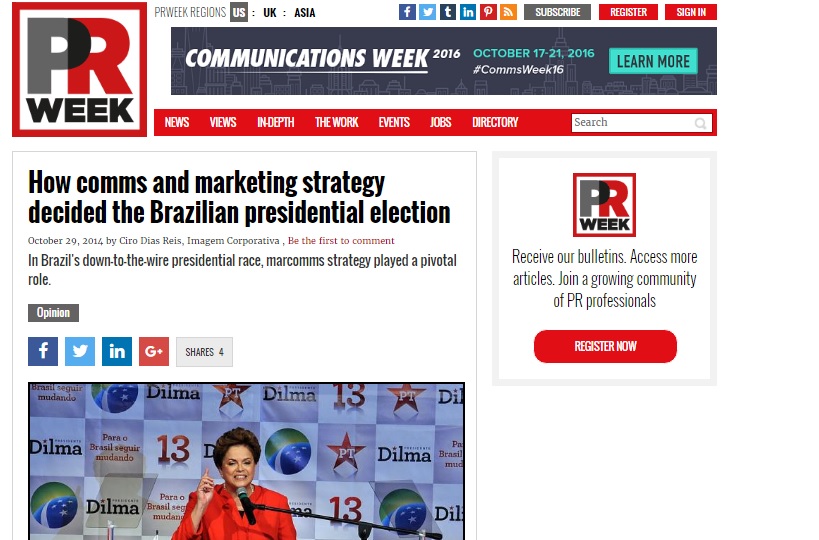
Newly reelected Brazilian President Dilma Rousseff
As in no other prior election in the country, the Brazilian presidential race concluded on October 26 was marked by particularly aggressive communication and marketing moves as left-wing incumbent Dilma Rousseff and pro-market Aécio Neves pursued the preference of more than 142 million voters.
Mutual accusations, efforts to melt down the image of each other, and a touch of populism set the tone during the campaign.
Brazil’s total population is more than 200 million, and voting is compulsory for those over the age of 18, which requires multiple strategies to convince different groups: from the sophisticated to the low-educated, and an anxious, emerging middle class to youngsters voting for the first time.
The actions of the two armies of professionals focusing on each candidate’s assets divided the country in two in a heated dispute up to the very last minute. In the end, Rousseff won, backed by 54.5 million votes (51.6% of the total) versus 51 million for Neves (48.4%).
There were moments of rivalry that would remind American citizens of the tension and expectations of the prolonged final stretch of the US presidential race in the year 2000, when George W. Bush and Al Gore came face-to-face in the clash for the White House and left voters holding their breath for days.
In Brazil, hundreds of specialists in political propaganda and marketing, researchers and analysts, journalists and bloggers who were hired – in general, with generous payments – by the two candidates worked hard to produce messages, content, data, statistics, surveys, and buzz on social media.
All of this was to rally hearts and minds in a country where, between August and October, radio and TV became the main stage for candidates. During this time, Brazilian law guarantees free time on the radio and TV. The stations provide weekly hours of free time each week for candidates to present their platforms to the nation.
At the end of the long journey of almost three months of campaigning, Rousseff and Neves had occupied nothing less than 27 hours of Brazilian TV network time combined. And many other hours were used by a variety of candidates, because in this general election, Brazilians voted for governor, senator, and representative in addition to president.
On the other hand, Brazilian law also compensates radio and TV stations for the time delivered to candidates because they are forced to reduce slots for advertising and commercial messages. This invoice is not cheap: TV networks alone will receive the equivalent of $336 million this election, and the money comes from the federal government.
The electoral battle was also fierce on the Web. On Facebook during election week, Neves boasted 3.15 million followers against 1.8 million for Rousseff. The incumbent, however, led on Twitter with 2.9 million followers against a mere 192,000 for Neves, who began using the 140-character platform just a few months ago but innovated by using WhatsApp during the final stretch of the campaign.
Brazilian Internet commentators added a touch of humor to the process: hilarious memes were created and popularized throughout the electoral campaign, displaying both candidates in the most diverse and improbable situations.
Among the issues most debated by each candidate’s supporters, the economy received special attention. Two days before the elections, The New York Times ran the headline, "In Brazil’s Election, a Stark Vote on the Nation’s Economy." The debate divided opinions between voters supporting a president practicing increasing governmental intervention in the market and those supporting an opposition leader advocating freer economic activity capable of stimulating private investments.
It was a true Boston Celtics-New York Knicks playoff atmosphere, where nerves wear thin at each disputed play.
Rousseff’s communication and marketing staff celebrated a victory based on a strategy that focused on the lower-income layers of the Brazilian population, those directly benefited by governmental social programs, specially one called "Minha Casa, Minha Vida" ("My House, My Life). This program, created for people who make no more than five minimum wages a month, opens the door for purchasing a small house to be paid partially by the government.
On the other side of the political arena, many supporters of Neves say he should have been more emphatic when criticizing the government – a couple of corruption scandals led to jail for some high-level staffers who worked for Rousseff and the previous president. Others say he could have more loudly pointed out promises and missions not accomplished by his opponent.
And yet others say the defeated candidate did not look around in a proper way. According to them, he had very good messages, which sounded like music to voters would support him nonetheless, not those who remained undecided for a long time and could have been convinced in a more creative way.
Ciro Dias Reis is CEO of Brazilian PR agency Imagem Corporativa; VP of PROI Worldwide; director of the Brazilian Association of PR companies, Abracom; and board member of the International Communications Consultancy Organisation, ICCO.
Autor: Ciro Dias Reis